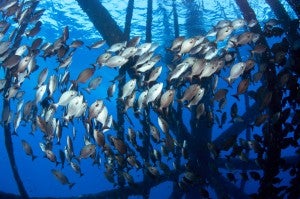Despite a lot of bad weather and the end of red snapper season, fishing is heating up in the Gulf of Mexico. Fishing isn’t the only thing that’s hot, though, as the debate over removing non-producing oil rigs in the Gulf is also going at a fever pitch.
I wrote back in late April about the current controversy regarding plans by the Department of Interior (DOI) for the expedited removal of these retired rigs. Lots of recreational fishermen oppose this policy, because the underwater structure creates a reef habitat for fish – nice for the fish – but also a great target for fishermen.
Several actions are underway to ensure that removal is just an option and that artificial reefing is also an option. As I mentioned in that previous post, Rep. Steven Palazzo of Mississippi and Sen. David Vitter of Louisiana have introduced bills in Congress. Since then, there was a proposal to amend the Farm Bill with a provision on rigs and the Gulf of Mexico Fishery Management Council is continuing the process to designate the retired rigs as “essential fish habitat.” Also, other members of Congress, Governor Rick Perry of Texas, state fisheries managers and sportfishing groups have all written letters to Secretary Ken Salazar seeking at least a delay in implementing outright removals and, ideally, a new policy altogether.
EDF is helping call attention to these proposals and requests. In our meetings and conversations with staff at the White House and Department of Interior it has been clear that confusion is a big stumbling block. We all need better numbers and information about what is going on. What seems to many to be a deadline for removal is, to the government, only a requirement to file a plan for either reefing or removal. Boat captains have tallied removals that they have seen, and the agency has different numbers.
Toward clearing this up, DOI’s Bureau of Safety and Environmental Enforcement (BSEE) has begun to collect its information and posted it on a website. We understand further information will appear in the next few weeks. It looks to us like a good place to start.
The website is: http://www.bsee.gov/Regulations-and-Guidance/Decomissioning/index1.aspx
As BSEE doesn’t overflow with enthusiasm for artificial reefing on this website, EDF will continue working with them to ensure reefing is a viable option and taken when appropriate. We will continue to emphasize the other side of the equation: the lack of information on the impact of rig removal on the species that inhabit the artificial reef structures. We will also advocate for the vision of a system of artificial reefs that is accessible to fishermen and divers, managed in a way that supports fish and coral populations and with monitoring and study so we can better understand their value and function as fish habitat.
More progress on the issue has come from Texas A&M University–Corpus Christi’s Harte Research Institute (HRI). The institute has embarked on new research to explore the value and impact of artificial reefs on fish. “Our goal is to say definitively yes or no…” said Larry McKinney, Director of HRI in a recently published post on Scientific American’s Expeditions blog.
The alternatives to blanket removal that have been proposed offer a number of tremendous benefits to the Gulf’s ecosystems and communities and deserve more consideration by decision-makers.
Update: On July 26, 2012, the day we published this post, a letter from 20 Congressmen was delivered to U.S. Secretary of the Interior Ken Salazar asking for a moratorium on the removal of retired oil rigs in the Gulf of Mexico. You can read the letter here. As Congressional efforts continue, EDF will continue to support a temporary moratorium on removal and call for additional research on the value of retired rigs as artificial reef habitat.










